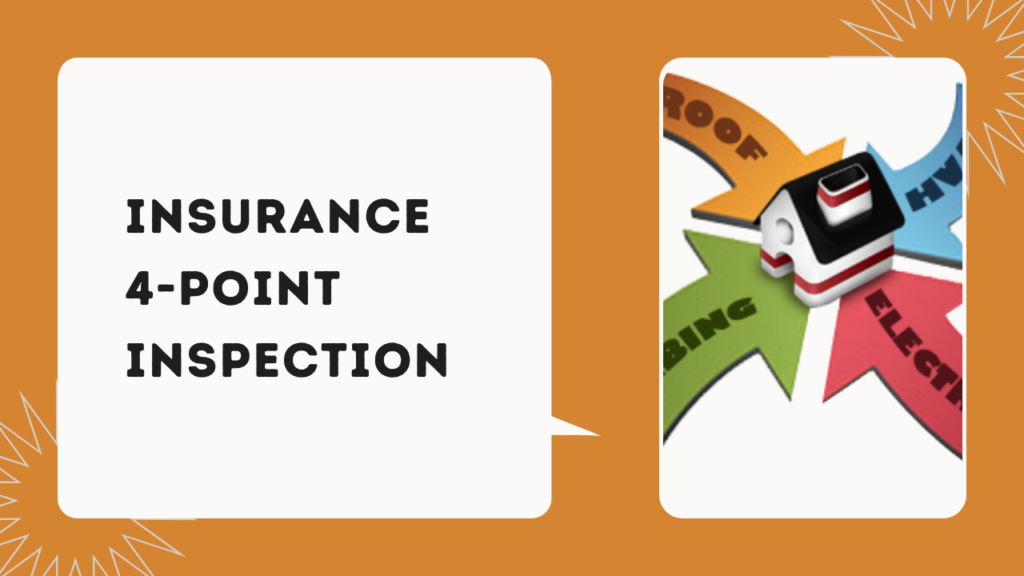Insurance 4-point inspection is a type of home inspection where the four main systems in your house are examined and the risk level is evaluated. Your roof, electrical, plumbing, and HVAC (heating, ventilation, and air conditioning) systems are the four main systems.

Although this inspection is typical for older homes, it is quick and could give you additional options for home insurance. It looks at the current state of a house, apartment building, or other residential establishment.
The outcome of the inspection indicates to the insurance provider how much risk they will take if they offer homeowners insurance.
What is a 4-Point Inspection?
It looks at a home or condo’s systems. A home inspector examines and tests the systems to make sure they are in good working order or they need to be replaced or repaired.
During this inspection, any areas that could lead to an insurance claim will be identified. The inspector will go over what needs to be fixed if the house fails any part of the inspection.
However, it might not be necessary for your home, depending on where you live and how old it is. All insurance companies, however, demand an inspection if you want to obtain homeowners insurance. An essential component in establishing a person’s eligibility to buy a house is this test.
How Much Does Insurance 4-Point Inspection Cost?
Depending on the state and the inspection company, it may cost different amounts. An inspection will typically cost between $75 to $175. It is vital to confirm that the company is authorized and qualified to accurately assess the current condition of your home or future property.
Factors that Affect the Cost of Insurance 4-Point Inspection
The cost varies depending on the following:
- The size of the home.
- Location.
- Age of the property.
- The insurance company.
As well as other additional services.
What Does an Insurance 4-Point Inspection Cover?
During the inspection, a certified inspector looks at the following systems:
- HVAC (heating, ventilation, and air conditioning): The inspector will make sure that hot and cold air is released from the vents and will search for any signs of leaks or ventilation system problems.
- Electrical: Houses with aluminum, knob-and-tube, and copper wiring are frequently uninsurable due to the increased risk of fire hazards.
- Plumbing: The inspector will look at pipes to determine how likely it is that they will burst and cause water damage.
- Roofing: Inspectors determine the roofing system’s age, composition, and lifespan.
These are the four main systems.
Benefits of a 4-Point Inspection
It provides the following benefits:
- Quick and inexpensive: It can be completed quickly and cheaply. A trained, licensed professional can inspect a property in a few hours.
- Guarantee the condition of your real estate: If you intend to sell your home, the inspection can help you determine which issues must be addressed before listing.
- Prevent future headaches: An inspection can help you avoid unexpected repairs, upgrades, or replacements by preemptively checking the home’s major systems.
These are some of the benefits.
How to Get an Insurance 4-Point Inspection
Before getting a homeowner’s coverage, most insurance providers will inspect the property. To get this inspection done, follow these procedures:
- Visit the official website of a credible insurance company that provides home inspections such as Allstate.
- Reach out to them by calling the contact information on the homepage, to discuss your home insurance needs and how to go about the inspection.
The inspection report will be reviewed by Allstate. If everything satisfies their requirements, your coverage will be approved.
Frequently Asked Questions
Here are some frequently asked questions.
What Does Insurance 4-Point Inspection Cover?
If a disaster strikes, your home’s contents and repairs will be fully or partially covered by homeowners’ insurance obtained through a 4-point inspection. Furniture, clothing, kitchen appliances, HVAC systems, and more are all covered.
Who Pays for the Insurance 4-Point Inspection?
In almost all cases, the homebuyer will cover the cost of any required insurance inspections.
What if my Home Fails Inspection?
It is not the inspector’s responsibility to determine whether your home “passed” or “failed” the inspection, despite what many people think. Recall, that they are merely collecting information regarding the present condition of the house. Based on the inspection report, your insurance provider may, nevertheless, determine whether to provide coverage.
Conclusion
The inspection will be necessary to provide your insurer with information regarding the risk of your home, regardless of whether you are looking to purchase a home or just renew your policy. Even though they are optional, it is crucial to get insurance for your new house.
